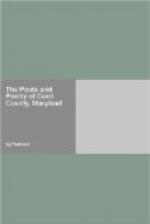And all those burning suns of night
That light the distant space,
Declare thy power infinite,
Thy wisdom and thy grace.
We try to scan those regions far
Till vision fades away,
And yet beyond the utmost star
Are plains of endless day.
And when we earthward turn our gaze,
With wonder and delight,
We marvel at the lightning’s blaze
And tremble at its might.
And yet, thy hand is in it all,
For there thy love is seen:
By it the rain is made to fall,
And earth is robed in green.
The cyclone on its path of death
That rises in an hour,
The fierce tornadoes’ wildest breath,
But faintly show thy power.
And though the laws are yet unknown
That guide them in their path,
They are the agents of thy throne
For mercy, or for wrath.
Thus I behold thy wondrous arm
And own thy works divine:
Then what in life or death can harm
So long as thou art mine?
TOBIAS RUDULPH.
Tobias Rudulph, the subject of this sketch, was the third person of that name and was the grandson of the Tobias Rudulph, who was one of four brothers who emigrated from Prussia and settled in Cecil county early in the eighteenth century. For many years the family took a conspicuous part in public affairs.
Tobias Rudulph’s uncle and his uncle’s cousin Michael, the son of Jacob, and the uncle of Mrs. Lucretia Garfield, very early in the Revolutionary war joined a company of Light Horsemen, which was recruited in this county and served with great bravery and distinction in Light Horse Harry Lee’s Legion in his Southern campaigns. They were called the Lions of the Legion.
John Rudulph won the title of “Fighting Jack” by his courage and audacity, both of which essential requisites of a good soldier he seems to have possessed in a superabundant degree.
Tobias, the subject of this sketch, was born in Elkton, in the old brick mansion two doors east of the court house, on December 8, 1787. He was the oldest of four children, namely: Zebulon, a sketch of whose life appears in this volume; Anna Maria, who married James Sewell; and Martha, who married the Reverend William Torbert.
Anna Maria is said to have been a poetess of no mean ability, but owing to the state of literature in this county at the time she wrote, none of her poetry, so far as we have been able to learn was published, and after diligent search we have been unable to find any of her manuscript.




